Joel Selwood grimaces as he injures his left ankle for a second time on Friday night after being tackled by Sydney’s Lance Franklin. Photo: AFL MEDIA
RoCo’s Wrap: Selwood surgery can spell only danger for Geelong
St Kilda stayed alive, pushing West Coast to the precipice. Richmond officially booked a spot in September and might also have sealed a top-four spot. Adelaide blew their local rival off the park. But the biggest result of round 20 might have come in a medical room.
If Geelong wasn’t feeling bad enough after Friday night’s shellacking at the hands of Sydney, the news that Joel Selwood required surgery to his left ankle for a syndesmosis injury compounded the hurt.
At best, the Geelong skipper and midfield heartbeat will be back for week one of the finals. The Cats dare not think about the worst. Suffice to say GWS star Stephen Coniglio has only just returned from similar surgery after a 10-week layoff.
Where does this leave Geelong? In enormous trouble. The Cats are fourth, six points up on Port Adelaide, Sydney and the Western Bulldogs. But that’s little comfort now.
Geelong faces the Tigers (albeit at home) next Saturday. It has Collingwood (which has already beaten the Cats this season) the following week. And a final round clash with the Giants, who turned in their most complete performance for a couple of months against Melbourne on Saturday.
The Power, Swans and Dogs all have easier assignments than that. And the seemingly eternal question about Geelong’s reliance upon Selwood and Patrick Dangerfield has, if anything, only intensified of late.
The Cats certainly missed the suspended Dangerfield more on Friday night than Sydney did Josh Kennedy. And without Selwood?
There’s not much historical data on that, given that over the past five seasons, the midfield warrior has played 110 of a possible 112 games.
For the record, Geelong just managed to escape with a draw against GWS a month ago when Selwood was still shaking off concussion, and beat the Bulldogs by just eight points in 2015 when he was out suspended for a week.
What there is plenty of data on, however is the enormous influence he exerts over the Cats’ performance when he is there. And that’s just in statistical terms, leaving alone his leadership presence.
Currently, he’s averaging 26 disposals per game, third for the Cats behind Dangerfield and Mitch Duncan. That’s a sizeable chunk of possession missing at a critical time, not to mention the damage done to the Cats’ inside game.
Dangerfield averages 17.6 contested possessions per game, Selwood 13.8. No other Geelong player is even in double figures. And across the AFL, no other Cat is even in the top 40.
Clearances? It’s 7.2 for Dangerfield, 6.3 for Selwood, no other Cat over five. For centre takeaways, it’s an average of three each for the champion pair, the next best 1.5. You get the drift.
Prior to round 20, Geelong was ranked second on the differentials for contested ball. But the Cats were in the red for clearance numbers relative to their opposition, behind five other members of the current top eight.
It’s hard to think of too many others players in the AFL whose absence hurts their line-up more than Selwood’s does Geelong. And without them wanting to dwell on others misfortunes, that injury update suddenly gave three other teams renewed hope of perhaps snatching a double chance.
At the top of the ladder, meanwhile, Adelaide marches on. And if the Crows got out of jail last week against Collingwood, it was a release they celebrated in stunning fashion in the 43rd “Showdown” with an 84-point thumping of Port Adelaide, their biggest-ever win over their arch rival.
This game was over almost before it began, only Adelaide’s profligacy when it came to conversion sparing Port and drubbing of well over 100 points.
Some of the early numbers were incredible. On a day on which constant rain made ball-handling difficult, even by quarter-time the Crows had almost doubled the Power for possessions.
That Adelaide were out to make a statement about whether they were made of tough enough stuff for a premiership assault was patently clear. After losing the contested ball count by a staggering 50 against the Pies last week, they won it by nearly as many on Sunday, already 21 up by the first break, at which time the inside 50 count was an even more staggering 21-5.
With a six-point buffer at the top of the ladder, the Crows have all but sealed an all-important home final, but the symbolism of this power-packed performance was no less significant.
Port ranks higher than Adelaide for contested ball and clearances, but the Crows smashed the Power in the clinches, ruckman Sam Jacobs making his own personal statement against popular All-Australian ruck fancy Paddy Ryder, and the on-ballers at his feet revelling in his dominance.
Rory Sloane had a ripper, but the support is coming for him now on a weekly basis, the Crouch brothers racking up more than 60 touches between them and Richard Douglas also very busy.
And with that sort of frequency of delivery, a forward set-up as potent as Adelaide’s is always going to do damage. Josh Jenkins, Eddie Betts and Taylor walked bagged 11 goals between them as the Crows had 40 scoring shots.
The cynics continue to claim finals football will starve Adelaide of scoring opportunities. Opponents certainly better hope that is the case, because with even an average amount of chances, this is an attack considerably better than any other team in the competition.
The Crows are none too shabby defensively, either, still fourth for fewest points conceded, and with a tremendous rebounding runner in Rory Laird averaging more than 30 touches per game.
Richmond, meanwhile, without having the flashiness of the Crows, continues to get the job done, the Tigers’ efficient disposal of Hawthorn at the MCG their eighth win in 10 matches and another underlining of their consistency, even without a key in Jack Riewoldt.
While it has lost matches it should have won, in 18 games Richmond has been humbled just twice. Despite an absence of height in attack, the Tigers still score enough, and after round 20 are officially the most miserly team in the competition, conceding just 77 points per game.
If the old maxim about how finals are played holds true this year, Damian Hardwick’s side is going in equipped with most of the essentials. Their clash on Saturday with Geelong at home is not only third versus fourth, but a real potential indicator of how far this Tiger assault can go.
Richmond has lost its last 12 games against Geelong. Its last win came back in 2006 at the foreboding Simonds Stadium. But with the Cats now Selwood-less, the Tigers haven’t had a better chance of breaking the drought. If they do, you’ll have to book early to get on the bandwagon.

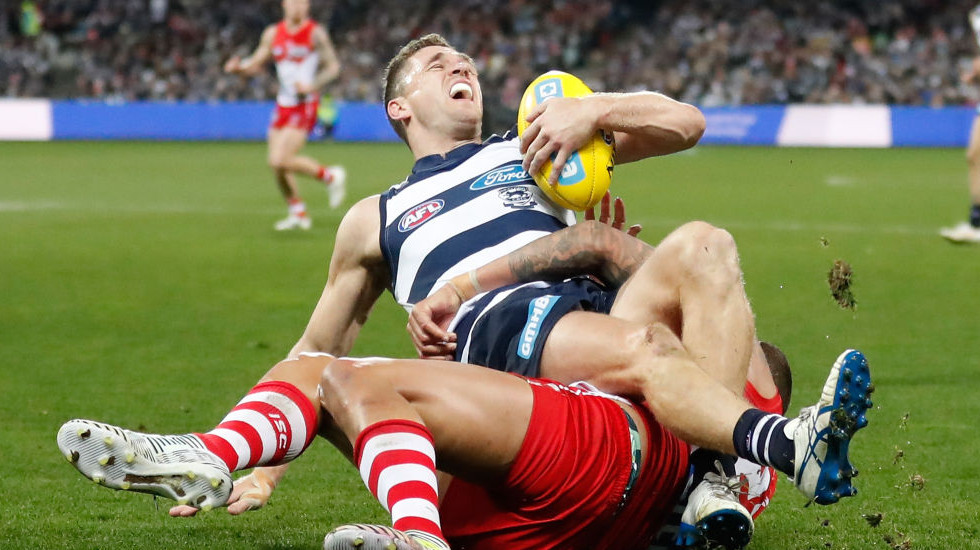
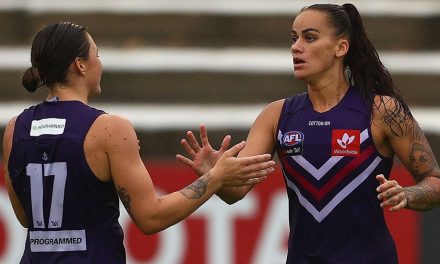
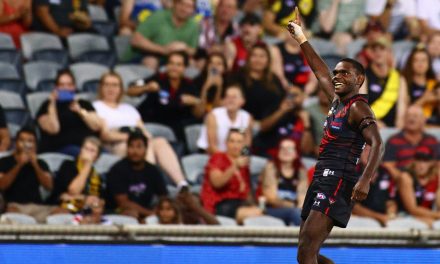
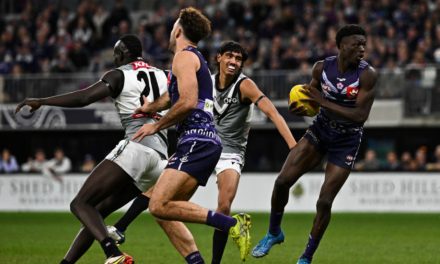
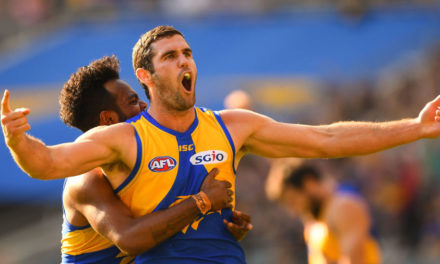






Ayup Rohan… my Cats were suddenly in deep doo-doo once Selwood went down.. to now lost Hawkins and Duncan means it will be a phenomenally difficult task for a supporting cast that has failed to support on many an occasion already this season. Top four is looking tough now because three defeats are not out of the question, leaving Geelong with probably interstate sudden death final to begin September. I had been so buoyant until about two weeks ago…..
Richmonds tackling is elite, it hasn’t been like that since 73/74. When the Tigers play like that premierships follow.
Still keeping the lid on but after last year I am loving the way the Tigers are playing. #GoTiges